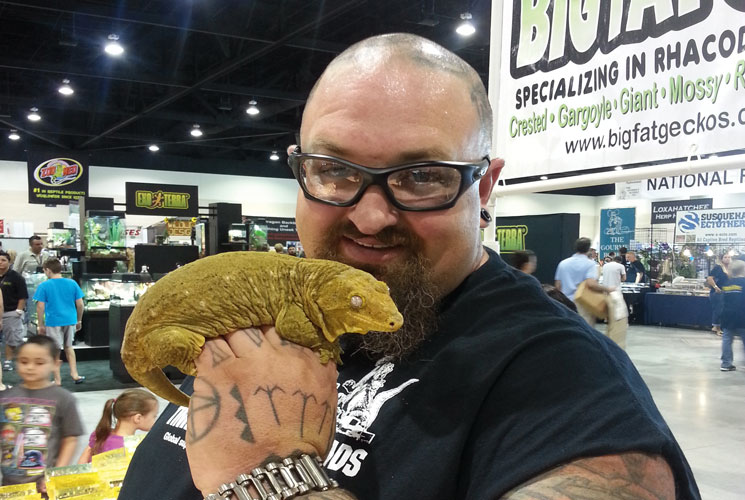Many know Ton Jones from the Spike TV show “Auction Hunters,” but he’s been a fixture in the reptile community for years I t
Many know Ton Jones from the Spike TV show “Auction Hunters,” but he’s been a fixture in the reptile community for years
I think I first met Ton Jones at one of the Reptile Super Shows in Pomona, Calif. He’s hard to miss, as any of his fans who have seen him on the popular Spike TV show, “Auction Hunters,“ can attest, he stands out in crowd. What many of his TV fans may not know, but many REPTILES readers likely do, is that Ton is a big-time reptile enthusiast, and he can frequently be seen at reptile shows around the country. If you attend some of the shows and miss him mingling with other enthusiasts and vendors on the showroom floor, a good way to find Ton is to attend one of the benefit auctions that are held at many of the shows, where Ton has been known to act as auctioneer.
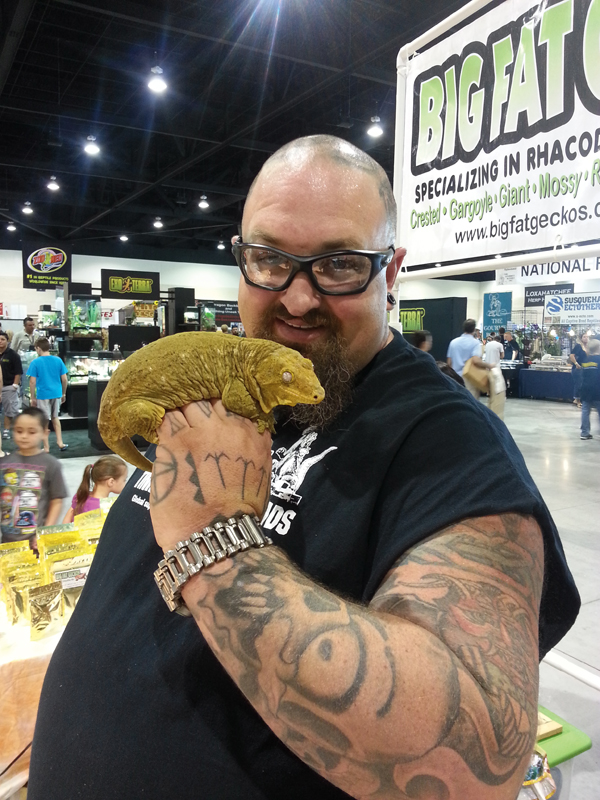
IMAGE COURTESY TON JONES
Jones is a fixture at many reptile shows.
Because he is a reptile guy as well as a TV personality, it seemed like it was time for REPTILES to have a chat with Ton.
Russ Case: First, give us some basic background-type stuff—where were you born, and have you always been interested in reptiles?
Ton Jones: I was born and raised in the Antelope Valley, on the edge of the Mojave Desert in California. I spent most of my youth chasing local horned lizards and gopher snakes, but as I got older my reptile collection expanded to include non-native and venomous species. By my teens, the collection had grown to the point where it could devour a week’s pay in one feeding!
RC: How large is your herp collection now, and what kind of reptiles do you keep?
TJ: My collection these days consists of many different morphs of ball python—mostly piebald, just like everyone else…LOL—a few dozen dwarf monitors, a few select reticulated python morphs and an ever-growing collection of albino venomous snakes.
RC: Do you breed any reptiles? Are you working on any breeding projects currently?
TJ: I’m involved in a few breeding projects, including a venomous project that includes albino Mojave, southern Pacific, prairie, western and Panamint rattlesnakes. I’m also working on dwarf monitor and retic projects, and even a ball python breeding program or two or three.
It’s really hard for me to keep up with my reptile projects while I’m filming “Auction Hunters” and traveling the country, so I’ve had to rely on some of my great friends—people like Tim O’Reilly from Prehistoric Pets, Joel Almquist at the Forever Wild Exotic Animal Sanctuary, and Mike Yacoub of Southbay Tropical Marine & Reptile. They handle most of the work involved in maintaining my collection.
Right now, my primary focus is on making enough money between the film and reptile industries to allow my friends and me to go play as much as possible. I got into the reptile industry because it was fun, and I stay in it because of the people I’ve met. Now it’s time to have as much fun as possible while enjoying our industry!
RC: “Auction Hunters” has made you a familiar face throughout the country, even outside of reptile circles. Please describe the show for readers who might not know about it.
TJ: We are going on five years now filming the TV show on Spike TV. The show follows me and my business partner, Allen Haff, as we travel around the country bidding on storage units hoping to score big treasure. Sometimes we win big, sometimes we lose big. When we find a cool antique or vintage item we try to do it justice by revealing the history of the item and demonstrating how it was used. For me, it’s always a bonus when I get to blow something up—that’s a perk of the job.
RC: I think “Auction Hunters” was the first show I saw involving people bidding on storage units, and now such shows have proliferated. Was it the first?
TJ: It was the first show of its kind going to production and was soon followed by at least seven other shows that have knocked us off. All I can say is, imitation is the sincerest form of flattery.
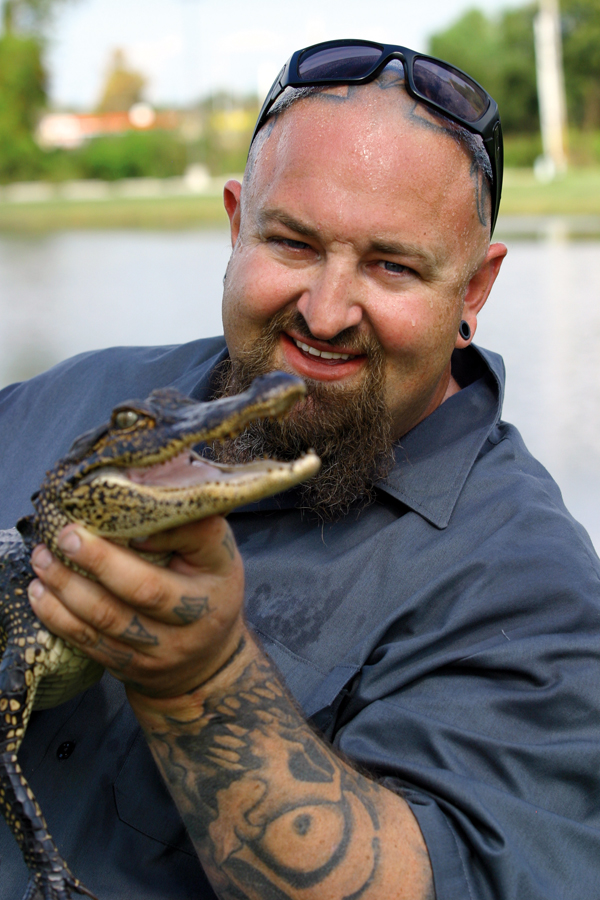
IMAGE COURTESY TON JONES
Jones has had an affinity for reptiles for decades.
RC: What was the best deal you ever got on something that was inside a unit you bought?
TJ: On the show we have found everything from gold and silver bars to firearms and cool antiques, but my best find ever—at least the one that brought me the most money—was when I bought a storage unit that a racing car company used to store all their tools, air compressors and rollways. I purchased the unit for $3,500 and sold its contents for more than $110,000, and I was able to do that within three days. It was not the most exciting find, but one of the most profitable! Even though the business is serious, Allen and I still have time to have fun causing a lot of destruction and mayhem. I cannot tell you how many storage units we’ve turned into our own personal bowling alleys using cheap IKEA dishware and furniture as our bowling pins.
RC: Has being on “Auction Hunters” helped or hindered your pursuits in regard to the reptile hobby/industry?
TJ: Before the show, I bought storage units to help fund my animal rescue efforts and my animal collection. Little did I know that buying them would turn into a full-time job that now, in part, keeps me away from my collection. At the same time, though, doing the show has helped make it possible me to travel to reptile shows all over the country, so there’s a little bit of give-and-take.
RC: Do you have many crossover fans between “Auction Hunters” and the reptile community? Do people at reptile conventions recognize you from the show and are surprised to learn you’re into reptiles? For me, the reverse was true, when I happened across the show for the first time: “That’s Ton! What’s he doing on TV?”
TJ: I am amazed at how many people have watched the show and how many fans are actual crossover fans. I meet quite a few “Auction Hunters” fans at reptile shows who tell me they had no idea I was into reptiles. At the same time, a lot of friends in the reptile industry have told me that they saw me on TV and ask what I was doing buying storage units. It’s been about a 50-50 split.
RC: Getting back to your reptile roots, what species, including any you don’t keep, have you always found especially fascinating?
TJ: To me, one of the most fascinating snakes is the Gaboon viper. Everything about that snake, from its pattern to its extremely large fangs, grabbed my curiosity from a young age. Other species that fascinate me include the false water cobra, inland taipan, African bush viper and the desert horned viper.
RC: Venomous snakes do have a special fascination all their own. What about amphibians? Are you into those at all?
TJ: Amphibians are awesome! I like frogs the best, including the blue reed frog, White’s tree frog and just about all the dart frogs. I can’t tell you what it is about them—I just like them.
RC: Have you worked with other animals besides herps? What about non-herp pets?
TJ: I have worked with many different animals, from elephants, rhinos, primates and bears to tigers, mountain lions and bobcats, all the way down to common household pets.
RC: Is much of this other animal contact because of your working with Forever Wild Exotic Animal Sanctuary?
TJ: Most of the contact I’ve had with mammals and other exotics came from my time at Forever Wild and when I was working in the film industry as an exotic wildlife animal handler. Back then, I had the pleasure of working with tigers, bears and other exotics on the sets of many different films and television shows. I’ve also worked with my friend, Hayden Rosenauer, and his elephants on a few occasions, and I have been called in to relocate bobcats and mountain lions that roamed from their natural habitat into populated areas.
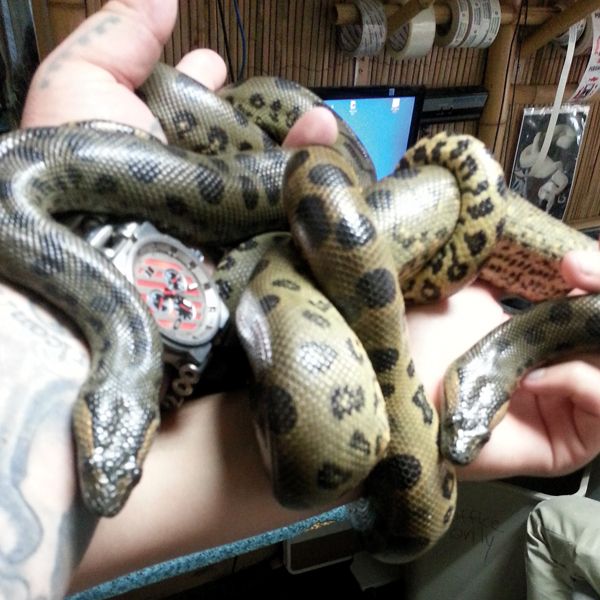
IMAGE COURTESY TON JONES
Jones with a few anacondas.
One of my more interesting mammal encounters took place in 2008, when I was attending classes at Antelope Valley Adult School to become a veterinary assistant. One afternoon, the head of the school came into the classroom to tell us that there was a bobcat family on the roof. I grabbed my trapping gear from my truck and was able to trap the mother bobcat and two kittens with relative ease.
They were very dehydrated, so I took them to the local vet hospital. While fluids were being administered, I learned there was another kitten back on the roof of the school, in an air conditioner duct. So I drove back to the school, climbed up to the roof and began fishing around inside the duct. Just as I spotted the kitten and leaned toward it, I fell into the duct. I crashed through the ceiling to the floor beneath, along with the kitten and much of the ductwork. Luckily, I was able to protect the kitten while I took the full brunt of impact.
Laying on the floor, barely conscious and with air conditioning ductwork stuck around my midsection, I opened my eyes to see I was nose-to-nose with a baby bobcat that appeared to be wondering what the heck had just happened. I gained my bearings and took it to be reunited with its mother and siblings. Three days later we successfully released them all back into the wild.
RC: You mentioned chasing horned lizards and gopher snakes when you were a kid. Do you still get out to do much field herping?
TJ: I still do as much field herping as possible, especially when I’m on location filming. If I get a chance, I’m off in the woods or in the desert chasing reptiles. I’ve gotten in trouble quite a few times with the “Auction Hunters” production crew while filming, due to my jumping into the water after gators in Louisiana or leaping out of a vehicle to pick up copperheads in the middle of a street in Missouri, to name a couple instances. The show’s insurance company hates me.
RC: What do you like best about the reptile community?
TJ: Being able to travel the country visiting my friends at reptile conventions. I also love going to see their facilities. It’s always fun getting to hang out with my reptile breeder friends at the shows, but it’s even more fun to go play around at their breeding facilities and raise hell for a day or two.
RC: Can you tell us about some of the hell you’ve raised?
TJ: The owners and employees of a lot of the places I visit—places like BHB Enterprises, Prehistoric Pets, LLL Reptile, Forever Wild and Southbay Tropical—spend a lot of time and effort keeping their facilities clean and organized. Then I show up, delaying their production while turning every cage inside out while checking out all their animals. There’s a lot of goofing around, throwing stuff and dumping water bowls into each other's shoes and having water hose fights inside the shops, etc. I’m told it usually takes about a week for these places to recover from one of my visits.
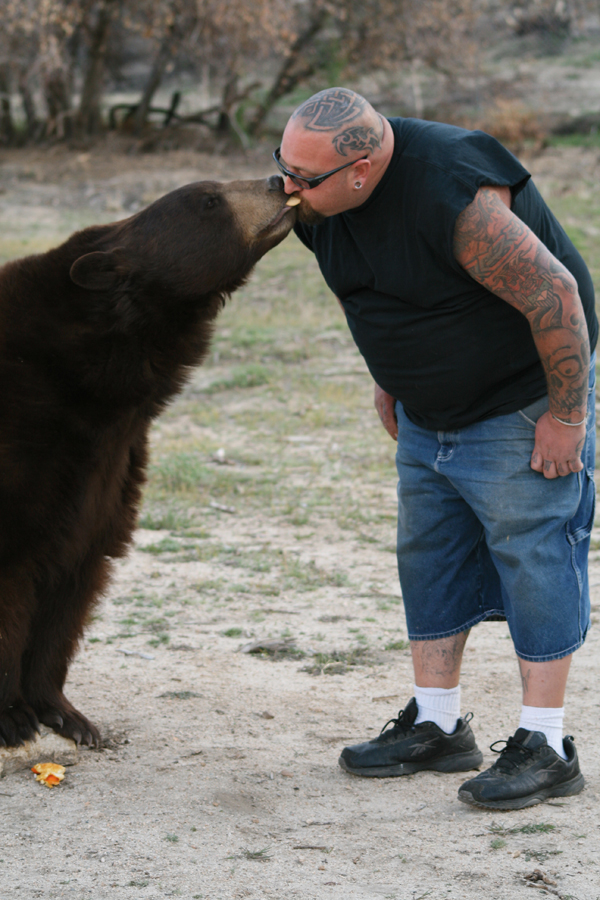
Image courtesy ton jones
Sharing cookies with a big black bear.
RC: You have volunteered at a number of reptile show auctions that raise money for USARK to help battle anti-herp legislation. I can personally vouch for your effectiveness as auctioneer—I bought a bottle of Kah Tequila Blanco from at a San Diego Reptile Super Show auction.
TJ: I do my best to help the effort by volunteering, as well as donating money and items for auction. I try to make sure that people know about our fight and what’s happening.
RC: Is there anything regarding your involvement with the auctions that makes you especially proud?
TJ: Having survived them all without getting cirrhosis of the liver.
RC: You’re a funny guy. Tell us a funny story.
TJ: One of the most recent took place at a reptile show, when I was standing around talking reptiles with Russ Gurley from the Turtle and Tortoise Preservation Group, USARK President Phil Goss and Josh Panos from Zoo Med. A cute girl approached us, smelling like sweet perfume and cheap beer, and asked if we would like to join her—she said she had a bunch of free beer and wanted to spend time with us guys. We paused briefly in our conversation to look at her, probably confused, and Josh asked her name. She said no names, just beer and fun. At that, we returned our attention to our conversation as if she did not exist, and she left. About 10 minutes later we paused to look at each other and began laughing because we just got hit on and totally blew the girl off so we could talk reptiles. You’ve gotta love the herper crowd.
RC: What are some tips you would give for someone interested in following in your footsteps?
TJ: Don’t. Following in my footsteps would be like taking a joy ride through Liberty City in the game Grand Theft Auto.
RC: Is there anything else you’d like to share with REPTILES readers?
TJ: As far back as I can remember, I’ve enjoyed the companionship and friendship of people in the reptile industry. I have learned so much, and I hope that the youth of today can experience the same kind of enjoyment from this community that I have. I want to thank each and every person that I’ve met on this journey who have made it so much fun for me.
Russ Case is the editor of REPTILES magazine (ReptilesMagazine.com) and Cigar & Spirits magazine (cigarandspirits.com).

